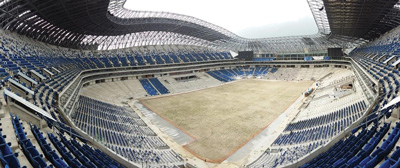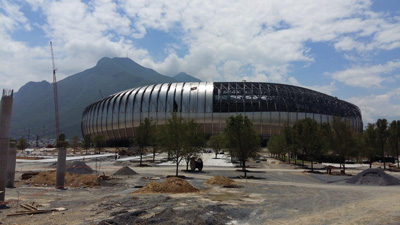BBVA Bancomer Stadium, the shiny new home of Club Monterrey opening Aug. 2, sets the bar much higher for sports development in Mexico.
The stadium, at a cost of $200 million, is the most expensive ever built in Mexico. Designed by Populous, it has 324 suites and 4,500 club seats, among the highest number of premium seats in all of Latin America.
Its technological amenities, common at NFL facilities and on a smaller scale at MLS stadiums, are largely absent from Mexican soccer venues. They include two HD video screens, ribbon boards, 900 television monitors, a state-of-the-art sound system, full Wi-Fi and a distributed antenna system to boost cellphone coverage.
 |
The stadium’s exterior walls will have “gills” to help the building breathe. Inside, plenty of premium seating.
Photos by: POPULOUS (2)
|
The stadium “will basically revolutionize the way people perceive and experience a soccer match in Mexico and Latin America,” said David Lizarraga, a senior associate with Populous who worked on the project and is a native of Mexico. “The technology implemented, the level of comfort and intimacy between fans and the field, does not exist. It’s a completely new model.”
Femsa, the world’s largest bottler of Coca-Cola products, owns the soccer club founded in 1945 and commonly known as Rayados (translated, it means “the striped ones,” a reference to the team’s navy blue-and-white striped jerseys). They play in Liga MX, Mexico’s top soccer league.
Femsa is privately financing stadium construction, supported by revenue streams such as premium seat sales and naming rights, similar to the traditional funding sources for North American sports facilities. The terms of the BBVA Bancomer naming-rights deal have not been made public.
Lizarraga, Populous’ lead architect and project manager, knows the city and the team well. He studied architecture at the Monterrey Institute of Technology and Higher Education, the same campus that’s home to Club Monterrey’s 65-year-old Technological Stadium. While he was a student there from 1989 to 1993, Lizarraga attended many Rayados games. The 35,000-seat facility, second oldest among all professional soccer stadiums in Mexico, was built with a track circling the pitch, and the large gap between fans and players does not provide the ideal game-day experience, he said.
In two months, when the new stadium opens for the Rayados-Benfica of Portugal friendly, memories of the older building will be wiped clean by a gleaming facility where fans sit much closer to the pitch.
The move to a new stadium includes a shift in the marketing strategy for selling premium seats, said Bill Rhoda, president of CSL International. CSL worked with Femsa on several studies and helped the group form a sales plan for naming rights, sponsorships and premium seats.
Most older soccer stadiums in Latin America, such as Mexico City’s 95,500-seat Azteca Stadium, have limited premium spaces typically “sold for life,” which denies the venue consistent revenue streams.
BBVA Bancomer Stadium
Location: Guadalupe, a Monterrey suburb
Opens: Aug. 2
Capacity: 51,000
Premium: 324 suites, 4,500 club seats
Architect: Populous
Concessionaire: Eurest Services
For BBVA Bancomer Stadium, the challenge for CSL was to help change the way of thinking for effectively marketing premium products in Mexico. Instead of the lifetime agreements, the team attached 15-year agreements for suites and club seats and sold out of all inventory.
Club Monterrey officials made the decision on their own on the length of those deals before CSL started helping them on the premium end, Rhoda said.
The suites, which Lizarraga described as “elegant but simple,” come with sliding windows, two rows of outdoor seats and restrooms inside each unit. They sold for $200,000 to $1 million, depending on size and location, with those fees paid over the 15-year term. The $1 million units at midfield have 16 fixed seats. The smaller suites have nine fixed seats.
The same financing package is in place for the club seats along the east and west sidelines, priced at $17,000 a person per seat, said Tonatiuh Mejia Moysen, the team’s executive vice president.
The stadium’s concessionaire is Eurest Services, part of Compass Group, the world’s largest food service company. Separately, an independent operator will run a 170-seat restaurant in the stadium’s south end that will be open year-round.
Monterrey’s rich history as a steel manufacturer and a brewing capital — it’s the city where Tecate originated, and the region’s first brewery opened in 1891 — inspired the building’s shapes and materials, paying homage to the beer stills and steel mills that gave the city its identity, Lizarraga said.
To help combat the heat in Mexico, the stadium’s aluminum exterior walls have crescent-shaped openings bringing air flow into the building to increase fan comfort. These openings are like the gills of a fish, Lizarraga said; they vary in size around the stadium and are illuminated at night.
“It was important to give the city and the fans the best building we could … something they could be proud of,” he said.





